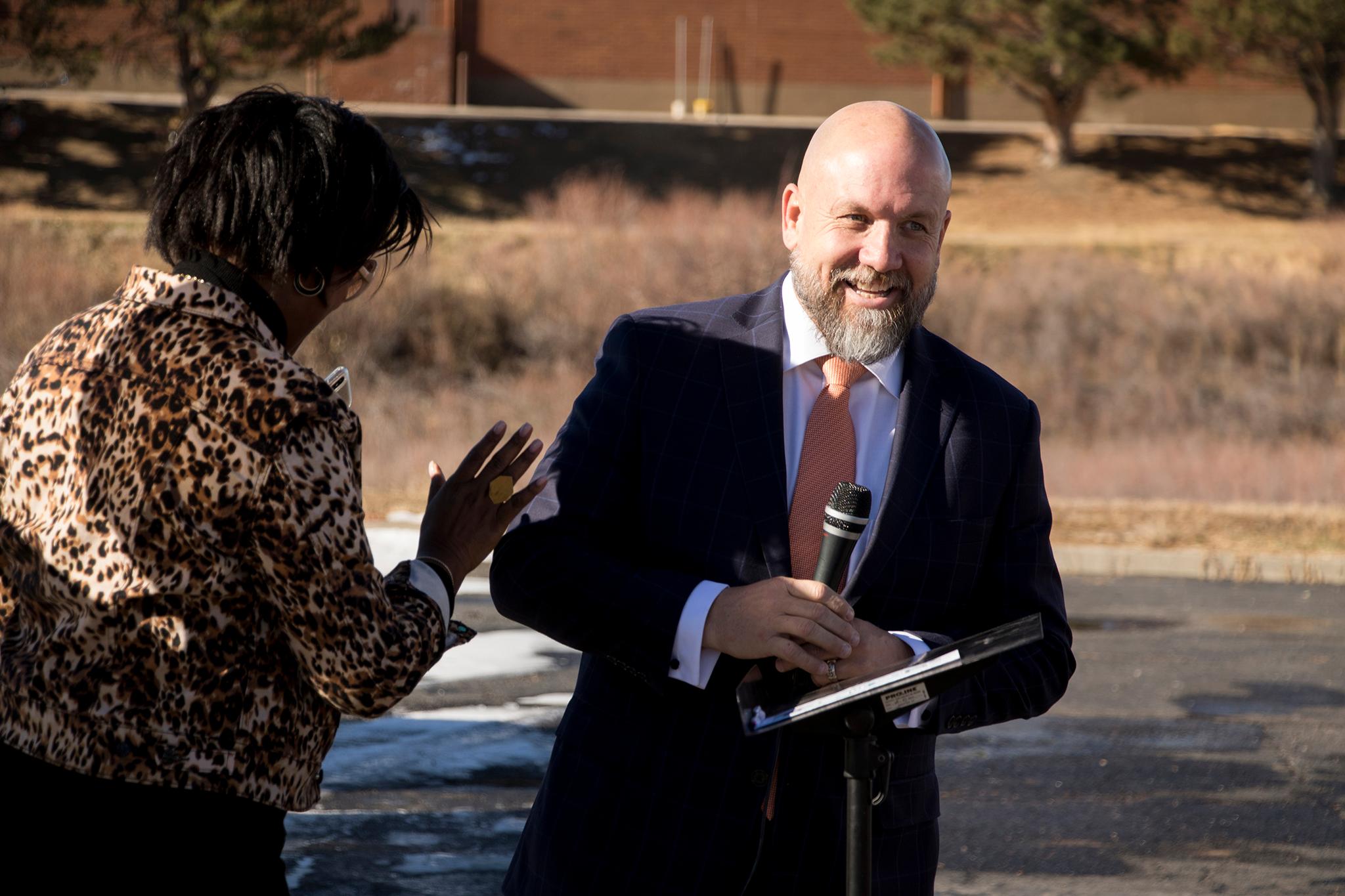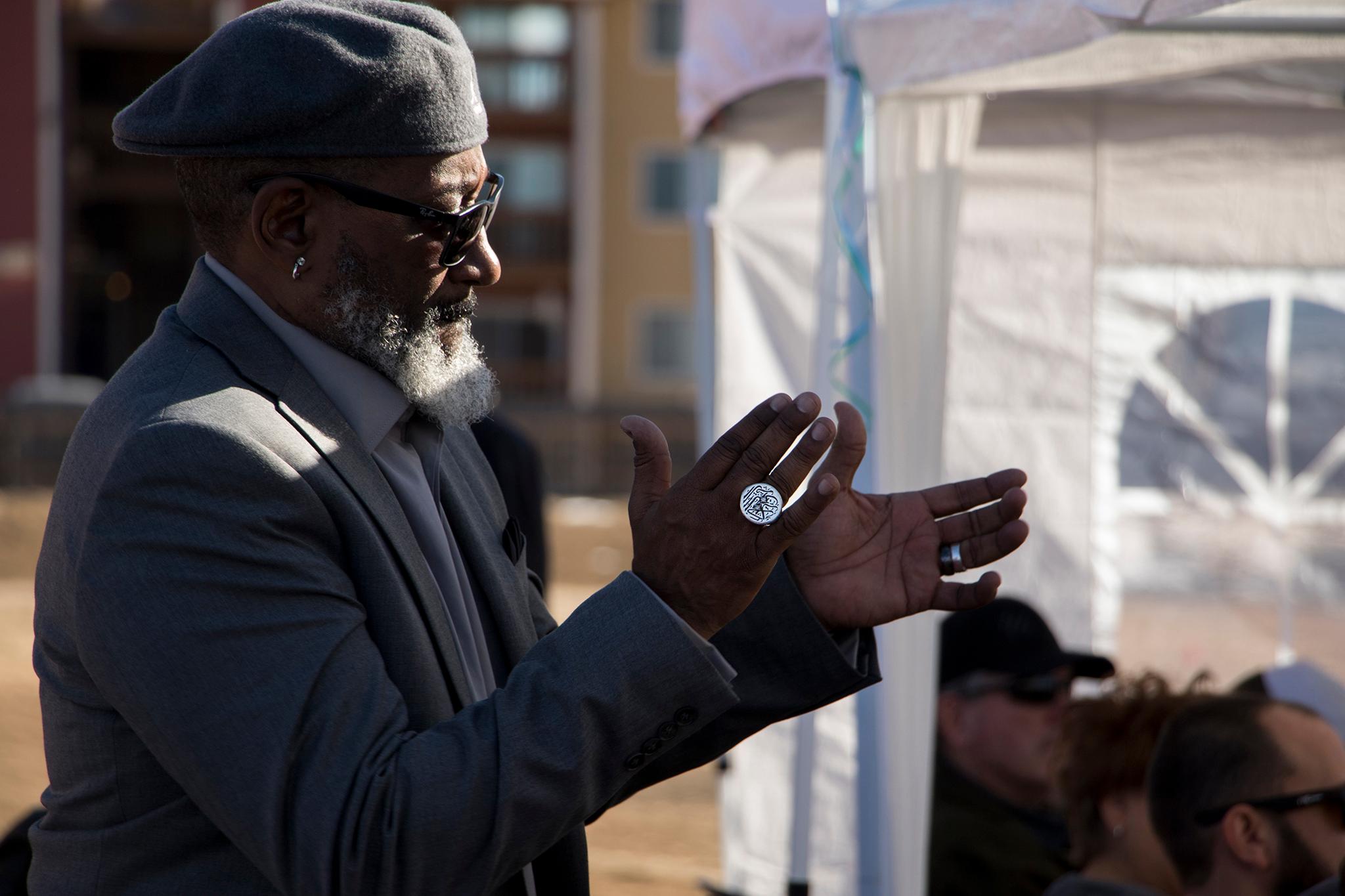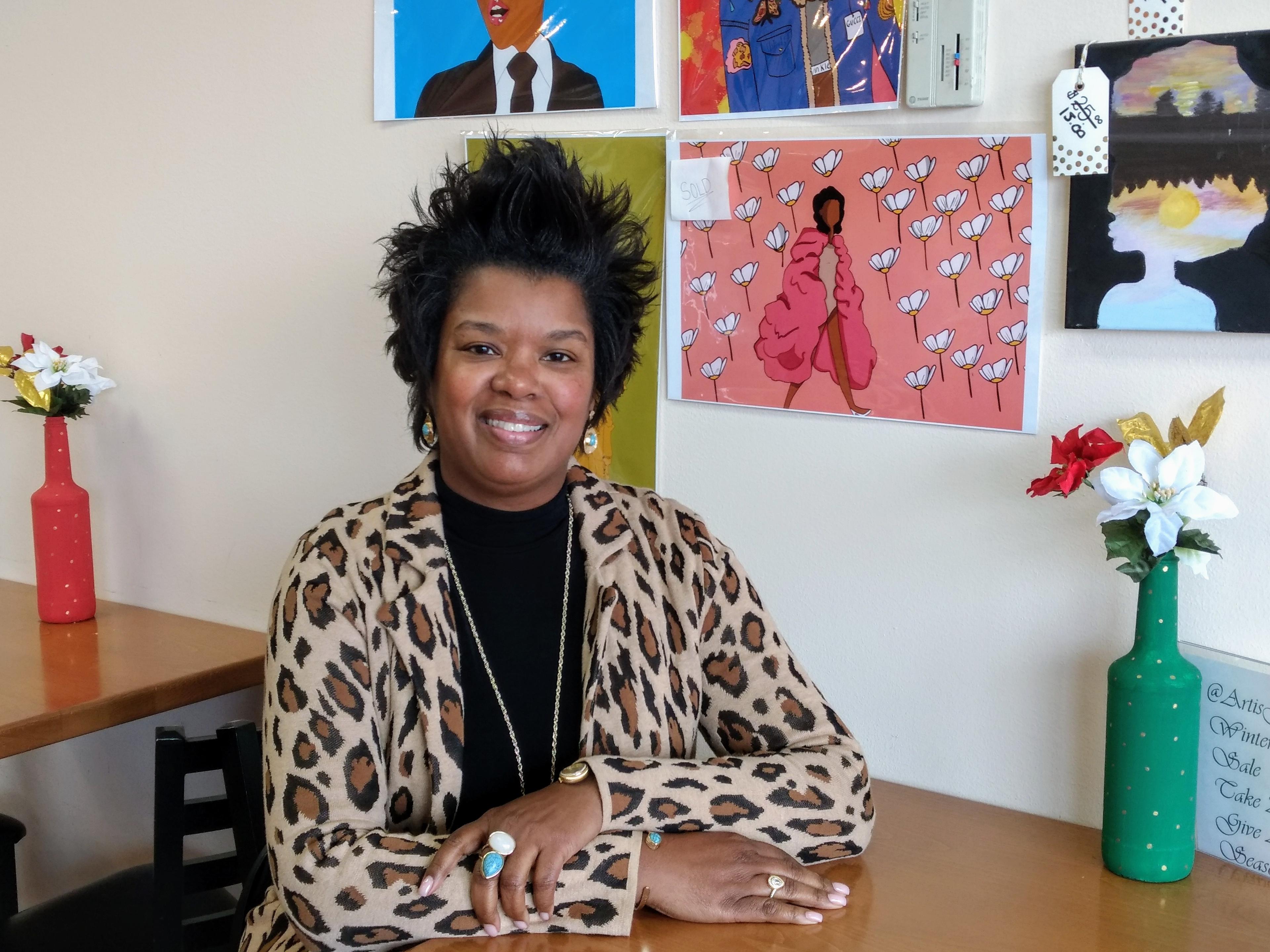An Air Force engineer. A defense contractor executive. A person who has experienced homelessness.
Leanne Wheeler has been all of the above. Now she wants to add another line to her resume: Aurora city councilwoman.
"I've always had a vision of working, being involved, being engaged," Wheeler said over a pot of tea at an Aurora café. Before sitting down for an interview, she had paused to talk careers with the University of Denver student whipping up lattes. It was quintessential Wheeler, who is a serial mentor.
Wheeler is running for one of two at-large seats that will be decided in the city's November elections. She announced her candidacy at City Hall on Jan. 7. Three days before and not far from City Hall, Wheeler had acted as mistress of ceremonies at the groundbreaking for Providence at the Heights, a complex for which she is project manager that will provide housing and counseling and other support for low-income residents that are likely to include people who have experienced homelessness or incarceration.
The groundbreaking and the candidacy are linked. Wheeler said she was in part inspired to run so she could be in a position to help other projects like Providence at the Heights navigate city rules and neighbors' concerns.

The PATH team was led by Hassan Latif, who founded Aurora's Second Chance Center a half dozen years ago to provide job training, mentoring and other support for former prisoners like himself. It included Elevation Christian Church, which sold land it wasn't using behind its parking lot for the project and whose pastor Scott Bloyer wholeheartedly embraced the prospect of PATH residents as neighbors. PATH went before Aurora's planning and zoning commission in July with requests to be exempted from zoning rules. Amid opposition from people living near the site, the commission voted 6-0 to turn PATH down. Months later the Aurora City Council voted 605 to overrule its zoning commission and approve the PATH site plan.
Latif said he was shocked and disheartened by the initial rejection from the planning and zoning commission. PATH wasn't asking for a rezoning, but simply exemptions from requirements on parking and the building's placement in relation to the street, requests that are not unusual and often granted.
"I was devastated," Latif said. "Because this came out of nowhere. We'd done everything planning staff had told us to do."
The blow to some extent felt personal because opponents expressed fear of people who have been incarcerated who might find homes at PATH. While he still absorbing it, Latif said, Wheeler started looking for solutions.
"Leanne, she just hit another switch," Latif said. "She doesn't stay in problem mode very long."
Wheeler began making plans to appeal to city council. She lined up supporters to speak on PATH's behalf and counter neighbors who had expressed concerns about how PATH would be managed and what it might mean for parking and home values.
Ian Fletcher of the Metro Denver Homeless Initiative spoke at the City Council hearing.
"It is about people," Fletcher said. "Specifically those who have histories of incarceration, disabilities or behavioral health challenges.
"Is this about a parking lot, or is this about people?"

Wheeler said she would like to see candidates defeat all five of the council members who opposed the PATH request. She ran because she does not believe in asking people to take action she's not willing to take herself.
She's not a one-issue candidate. When Wheeler announced her candidacy at City Hall to a crowd of supporters that included Latif, she promised to listen to the people of Aurora and champion their concerns.
"I want to hear what's going on in your lives," she said before heading into a city council meeting scheduled that night. Before her announcement she'd been chatting to a group of homeowners who were concerned about fracking, and that she wanted to support them before the council.
It's hard to put Wheeler, who describes herself as politically unaffiliated, in any box. One minute she's talking like a small-government Republican, the next she's describing caucusing for Bernie Sanders. She has sat on the boards of several nonprofits devoted to ending homelessness, but questions whether their strategies are effective.
The constant is a desire to serve, whether offering advice to a barista, joining the Air Force or running for office.
"I don't know if it's first-born crap -- 'I've got to fight the kids picking on my brother,"' said Wheeler, the oldest of three siblings.
She, her brother and her sister were raised in Columbus, Ohio. She was a good student, once taking part in a program for high schoolers with STEM talent offered at Ohio State by the research giant Batelle. She dreamed of becoming a chemical engineer and working for Dow or Dupont. Then she met a football player and says ruefully that she let her boyfriend distract her and before she realized it deadlines to apply for colleges and scholarships had passed.
She decided to approach military recruiters. Her father had served in the Air Force, she had Army veteran uncles and her brother was in the Army's high school training program, JROTC.
An Air Force recruiter assured her she could pursue her dreams of becoming an engineer. She still remembers the date she enlisted: April 18, 1986. A few months later she graduated from high school and headed to basic training in San Antonio, Texas.
Wheeler was later assigned to Offutt Air Force Base near Omaha, Nebraska followed by a stint on the Aleutian Islands, which are off Alaska and Russia. In 1990 she was sent to Colorado, to the North American Aerospace Defense Command. Though she was at first unhappy about getting what she thought would be another assignment in a bitterly cold part of the world, she soon discovered Colorado's blue skies and began to think of it as a place she could stay.
Wheeler said she's not allowed to divulge much about what she did for the Air Force, other than that it was engineering and involved data collection. Along the way she earned a bachelor's in computer information systems, finishing up at Regis University. A fellow student was working as a defense contractor and conversations with him led to an interview with a small company in Colorado Springs. At 24, she left the Air Force to work in a civilian data center.
"I was still smartly polished and showing up first thing in the morning. And realizing the civilians really didn't do that," Wheeler said.
She later became certified in Six Sigma Black Belt methodology, which sounds like a martial art but is a management strategy used to improve or change how companies or departments get things done. It's expertise Latif tapped when he asked her to be the project manager for PATH.
"She has an organizational background that could be applied to a lot of things," Latif said. "She has the ability of connecting the right person to the right task."
Now Wheeler wants to deploy her black belt on Aurora's government, saying that as a city council member she would ensure departments were running efficiently and supporting citizens who want to solve societal problems.
Wheeler would like to see more churches and more of the community as a whole use their own resources and get involved in ending homelessness, instead of leaving the task to nonprofits and government. As she sees it, a nonprofit -- Latif's Second Chance Center -- and a church were stymied by politicians and bureaucrats until they had to appeal to the City Council. And Wheeler thinks the City Council vote was closer than it should have been on a solution to homelessness and the affordable housing crisis.
"The government should not interfere with that because you're afraid of whose going to live there. That's what happened with PATH," she said. "I'm looking to get elected to create a high performing governance body that's constituent oriented."
She plans to rely on expertise and experience gained in a career with defense contractors that took her to California and Massachusetts and into management. Then came the Great Recession. Wheeler was working in Massachusetts when she lost her job in a wave of layoffs in 2008. She returned to Aurora, hoping to find a new job through the network in the state where she began her civilian career.
A woman who'd started working at 12 delivering papers for the Columbus Dispatch found herself struggling to find a job. She exhausted her savings, leaving only her Air Force pension of $253 a month.
"What do you mean I'm unemployable?" she found herself thinking.
"Probably my ego is what took the biggest blow."
"I was couch-surfing. When I couldn't do that, I was in a hotel, a bed in a shelter," she said. "I was effectively homeless for 16 months."
In the military, she'd mentored girls as a Big Sister. As a defense contractor she'd tutored young people in math and volunteered in a church's outreach ministry to people experiencing homelessness.
When she needed help, Wheeler turned to nonprofits that supported people in homelessness. But she found she didn't fit the programs they offered.
"I wasn't a single mom or a drug addict. I just ran out of money and needed someone to help me find a job and get back on track."
"They were sending me on job interviews to Home Depot," she said. The strategy, she thought, ended up putting people in jobs below minimum wage "so they have to keep relying on the government."
"It was during that process that I said, 'You guys could be doing this better,"' Wheeler said.
She went to a print shop and spent $10 to have cards made. She called her business FHS -- "for His glory" -- Consulting. She marketed herself to nonprofits as someone who could help them improve their processes.
She was still homeless when she got a contract through Denver's Road Home, a city effort to help people experiencing homelessness. Her job was to strengthen the management of a group that supported people who had been incarcerated. Wheeler started by convening staff members, some of whom had been incarcerated, to get their ideas on how to improve.
"This was the first time anyone had ever asked them about the work they were doing and how they would do it better," she said.
At the end of six training sessions, she said, tearing up at the memory, the staff gave her a plant and an apple.
"I thought, 'Lord, if I could do this all the time, this would be my vocation."
Around this time she met Latif, who was attending meetings convened by Denver's Road Home because so many people coming out of prison were homeless. Wheeler started attending mentoring sessions Latif was holding. He thought of her as a professional volunteering her time. It was months before he realized she was homeless.
"She was always dressed fabulously," said Latif, who's also known for sartorial elegance. It underlined for him that homelessness doesn't always look like we expect it to, and many people we would assume are doing fine and are working, yet struggle to afford housing and other necessities.
Wheeler, still homeless, was invited to serve on the boards of the Colorado Coalition for the Homeless and the Metro Denver Homeless Initiative. The plight of veterans experiencing homelessness was getting a lot of attention at the time. Wheeler wonders if the organizations just wanted a token veteran and did not expect her to contribute much.
"I'm not that vet," she said. "I'm a vet who's going to inform how we do things and how we get better."
Melanie Lewis Dickerson worked with Wheeler on the Metro Denver Homeless Initiative board and succeeded her as president of that board. Lewis Dickerson remembers Wheeler as helping the board focus on concerns about deficiencies in a data system used to track people experiencing homelessness. That led to a change of vendors last December.
Wheeler "is someone willing to say what needs to be said," said Lewis Dickerson, who is portfolio manager of Community Solutions, which fights homelessness with real estate development and other tools.
Lewis Dickerson believes it's Wheeler's experience in the military and the private sector that taught her to speak frankly about failure, and about failure as an opportunity to improve.
"She's funny and she's personable and she brings a grit and an appropriate level of levity to have certain conversations," Lewis Dickerson said. "She's honestly one of the funniest people I've ever had the privilege to work with."
Lewis Dickerson and Wheeler were both on the development team for the Close to Home campaign, a project of the Denver Foundation aimed at raising awareness that homelessness can happen to anyone. Wheeler has shared her own story as part of Close to Home, and Lewis Dickerson said her colleague often emphasized the importance of hearing from people experiencing homelessness about the solutions they need.
Wheeler's foray into politics began with work with United Veterans Committee of Colorado, which lobbied for a new veterans' hospital in the Denver region. In 2016 she campaigned for Amendment 72, a proposal to increase cigarette taxes that voters rejected, and Proposition 111, a call for limiting payday loan charges that passed.
Peg Perl first met Wheeler in 2017 when they both took part in programs offered by Emerge Colorado, which recruits women to seek public office. Perl said Wheeler is part of a wave of people stepping out of support roles into public life.
"There's been individuals who've been working very hard for issues for years. Maybe they've not been in the spotlight or on the podium. But they've been the experts," said Perl, a public interest lawyer who is running for Denver clerk in the May elections.
Wheeler brings to politics lessons that can only be learned from living, Perl said.
"She's got a great combination of the technical expertise and community engagement experience and her own life experience," Perl said.
Wheeler's experience of homelessness ended when she got an offer from a defense contractor. She took the offer letter to a landlord and secured an apartment. She got her belongings out of storage and tried to settle in, though at first she worried about losing her job again.
Looking back on her 16 months of homelessness, she thought of friends who paid for a movie ticket when they knew she could not afford it. And a manicurist who did her nails for free, saying she knew how important it was for the well-groomed Wheeler to know she looked polished and professional.
"It turns out it's not about the money. People say it. I know it," Wheeler said. "I was able to exist with a network of friends and some things in place on $253 a month."
She still has the same manicurist. Who's now also helping her raise campaign funds.














